Plot summary
Winter, AD 44: After a series of bloody battles, Camulodunum has fallen to the invading Roman army. While en route to join them, General Aulus Plautius's wife and children are shipwrecked in a storm, and fall into the hands of a dark sect of Druids who now demand the return of their brothers taken prisoner by the Romans.
At the same time, Durotriges tribesmen raid several towns near Camulodunum and the Second Legion under General Vespasian is sent to repel them. They stumble upon a village whose population massacred. Noticing the village has not been entirely looted, the Romans surmise that the raiders intend to return, and so lie in wait to ambush them. Afterwards, a local merchant liaison, Diomedes, secretly executes the survivors of the ambush and sets off on a vendetta to avenge his murdered family.
Centurion Macro and Optio Cato are summoned to General Plautius' tent, and tasked to infiltrate enemy territory and rescue the hostages before they are sacrificed to the Druids' dark gods. Their only assistance is two British guides, Macro's infatuation Boudica and her cousin Prasutagus, who was once a Druid and can guide them to their secret places.
After several false leads, the group raids a Druid lodge, but find only Diomedes impaled on a spit. The merchant informs them of a Druid headquarters in his dying moments. Macro attempts a daring ambush, but is wounded and unable to rescue the prisoners. Time is running out, as the Roman army is approaching their location in its continuing campaign against the Durotriges, and the Druids will execute the hostages before letting them be rescued.
Cato disguises himself as a Briton by painting his nude body with woad, then investigates a secret entry point. Finding it unguarded, he returns and leads a small band of Romans to infiltrate the stronghold and rescue Plautius's family whilst it is under siege. After desperate fighting, the General's wife and children are rescued from being burned alive, and Cato manages to kill the Head Druid but is seriously wounded with a sickle. He awakens days later in a brand-new field hospital in Calleva Atrebatum.
Despite his relief at having his family back, Plautius decides that no special commendations will be given to Macro or Cato, as they only did their duty. Vespasian convinces Plautius to allow him to reward the two officers with special phalerae , and Cato with a promotion to the rank of Centurion.
Meanwhile, Macro is disappointed when Boudica tells him that she is engaged to marry Prasutagus, and even if she was not, she is too much of a Briton to have a relationship with a Roman officer. Earlier in the novel, Macro realizes through his conversations with Boudica that even the "friendly" British tribes, such as the Iceni, are fiercely independent, and might do terrible damage if the Roman occupiers do not treat them with respect.

Boudica or Boudicca was a queen of the ancient British Iceni tribe, who led a failed uprising against the conquering forces of the Roman Empire in AD 60 or 61. She is considered a British national heroine and a symbol of the struggle for justice and independence.
AD 43 (XLIII) was a common year starting on Tuesday of the Julian calendar. At the time, it was known as the Year of the Consulship of Caesar and Vitellius. The denomination AD 43 for this year has been used since the early medieval period, when the Anno Domini calendar era became the prevalent method in Europe for naming years.

The 60s decade ran from January 1, AD 60, to December 31, AD 69.

AD 60 (LX) was a leap year starting on Tuesday of the Julian calendar. At the time, it was known as the Year of the Consulship of Nero and Lentulus. The denomination AD 60 for this year has been used since the early medieval period, when the Anno Domini calendar era became the prevalent method in Europe for naming years.
AD 61 (LXI) was a common year starting on Thursday of the Julian calendar. At the time, it was known as the Year of the Consulship of Turpilianus and Caesennius. The denomination AD 61 for this year has been used since the early medieval period, when the Anno Domini calendar era became the prevalent method in Europe for naming years.

The Roman conquest of Britain was the Roman Empire's conquest of most of the island of Britain, which was inhabited by the Celtic Britons. It began in earnest in AD 43 under Emperor Claudius, and was largely completed in the southern half of Britain by AD 87, when the Stanegate was established. The conquered territory became the Roman province of Britannia. Attempts to conquer northern Britain (Caledonia) in the following centuries were not successful.
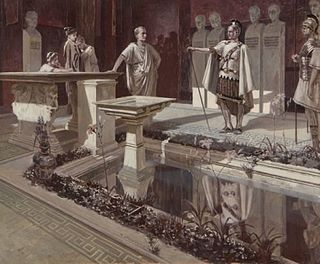
Aulus Plautius was a Roman politician and general of the mid-1st century. He began the Roman conquest of Britain in 43, and became the first governor of the new province, serving from 43 to 46.

The Iceni or Eceni were an ancient tribe of eastern Britain during the Iron Age and early Roman era. Their territory included present-day Norfolk and parts of Suffolk and Cambridgeshire, and bordered the area of the Corieltauvi to the west, and the Catuvellauni and Trinovantes to the south. In the Roman period, their capital was Venta Icenorum at modern-day Caistor St Edmund.
Quintus Petillius Cerialis Caesius Rufus, otherwise known as Quintus Petillius Cerialis, was a Roman general and administrator who served in Britain during Boudica's rebellion and went on to participate in the civil wars after the death of Nero. He later crushed the rebellion of Julius Civilis and returned to Britain as its governor.
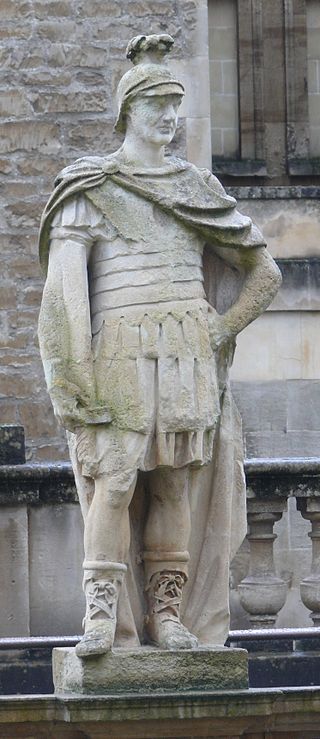
Publius Ostorius Scapula was a Roman statesman and general who governed Britain from 47 until his death, and was responsible for the defeat and capture of Caratacus.
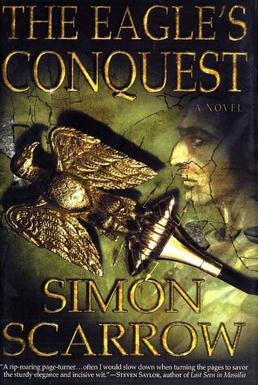
The Eagle's Conquest is a 2001 novel by Simon Scarrow, about the Roman invasion of Britain in 43 AD. It is the second book in the Eagles of the Empire series.
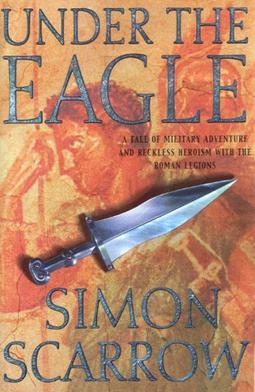
Under the Eagle is the first book in the Eagles of the Empire series, by Simon Scarrow and is his debut novel, introducing the characters of Quintus Licinius Cato and Lucius Cornelius Macro. It was published in 2000.

Eagles of the Empire is a series of historical military fiction novels written by Simon Scarrow. The series began in July 2000 with the publication of Under the Eagle, and as of March 2022 there have been 21 novels released in the series, with the 22nd novel due in November 2023.
Events from the 1st century in Roman Britain.

The Eagle and The Wolves is a 2003 novel by Simon Scarrow, the fourth book in the Eagles of the Empire series where main characters Macro and Cato command two cohorts of soldiers made up of warriors and nobles from the Atrebatan kingdom. This book follows their adventures in 44 AD during the occupation of Britain by Rome and Caratacus's following rebellion.
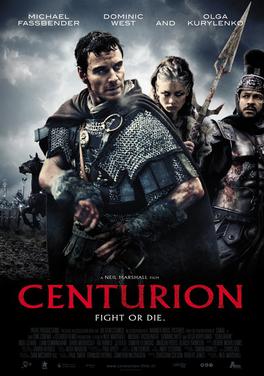
Centurion is a 2010 British historical action film written and directed by Neil Marshall, loosely based on the disappearance of the Roman Empire's Ninth Legion in Caledonia in the early second century AD. The film stars Michael Fassbender, Dominic West and Olga Kurylenko. It received mixed reviews and performed poorly at the box office, only earning half of its $12 million budget.
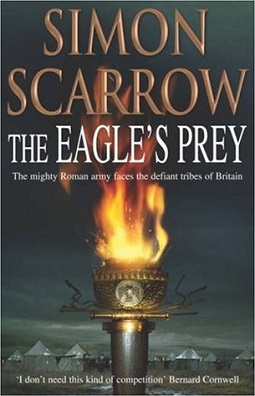
The Eagle's Prey is the fifth novel in the Eagles of the Empire series by Simon Scarrow. It was published by Headline Publishing Group in July 2004.

The Eagle's Prophecy is an historical novel by Simon Scarrow, published in 2006 and set in Ancient Rome.
This is part of a series on the History of Norfolk

The Boudican revolt was an armed uprising by native Celtic Britons against the Roman Empire during the Roman conquest of Britain. It took place circa AD 60–61 in the Roman province of Britain, and was led by Boudica, the Queen of the Iceni tribe. The uprising was motivated by the Romans' failure to honour an agreement they had made with Boudica's husband, Prasutagus, regarding the succession of his kingdom upon his death, and by the brutal mistreatment of Boudica and her daughters by the occupying Romans.
This page is based on this
Wikipedia article Text is available under the
CC BY-SA 4.0 license; additional terms may apply.
Images, videos and audio are available under their respective licenses.














